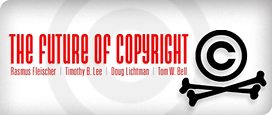Copyright law and copyright policy are both in the midst of enormous change. That seems to bother Rasmus Fleischer and for reasons that I cannot understand. As Fleischer emphasizes in his lead essay, in recent years the technologies available to facilitate the creation and distribution of creative work have themselves undergone enormous change. Of course copyright law and policy are busily following suit. Copyright, after all, is about building an environment where expressive work is created and ultimately shared. If technology alters the costs associated with any of the relevant steps, or opens up new possibilities in terms of who can be involved, or in any of a million other ways changes the social calculus, copyright law should identify those new possibilities and adjust accordingly. That process is not evidence of a legal regime overstaying its welcome, or an incumbent industry inappropriately fighting for its survival. It is evidence of a legal system properly at work, engaging in the changing realities of the field it is designed to nurture.
But Fleischer, it seems, would have none of it. Copyright law in his ideal world would remain stagnant in the face of technological change, neither taking steps to protect the work that has traditionally been within copyright’s purview nor in any way influencing the development of copyright-related technology. Copyright law would be sent to the corner. Technology would determine not only what we are capable of, but also what is actually done.
And how would artists survive in Fleischer’s brave new world? Fleischer suggests that a world without copyright would work just fine, thank you very much. Instead of selling music, Fleischer tells us, musicians would earn their keep through public performances. Instead of selling video games, the computer game industry would recoup expenses by hosting online worlds. Fleischer says nothing about the movie industry, but on his view movie companies presumably would earn their cash not by selling tickets at the box office but instead by peddling action figures and t-shirts. Copyright would be dead. Artists would still flourish.
This analysis is of course familiar. Esther Dyson wrote in Wired well over a decade ago about a similar shift in business strategy.[1] But Fleischer is too quick to embrace the Dyson approach. Yes, there are other ways for singers, writers, programmers, and the like to earn whatever they need to support their craft. But these approaches have substantial limitations, ones that make clear the continued need for a viable copyright option.
Consider, for example, the suggestion that musicians give away their music and sell instead concert performances. This suggestion might work well for a mainstream artist who can travel the big cities and fill stadium after stadium with paying fans. But what of the niche performer? The very technologies that Fleischer celebrates are technologies that finally make it possible for smaller acts to distribute their work to a geographically dispersed fan base. But if those acts cannot profit from the duplication and distribution of their work and are left only with the option of gathering their fans at in-person venues, geography would again become an insurmountable problem and the niche acts that copyright could today support would instead again be relegated to a deeply second-class existence.
Similarly, movies indeed could be funded through the sale of related merchandise like action figures and movie-themed clothing. But that, too, would work for some movies but not others. Star Wars would still get produced and then spawn thousands of Ewoks. A Beautiful Mind, not so much, unless I am sharply underestimating the demand for John Nash action figures and accessories.
The same criticism can be repeated across all of the Fleischer and Dyson stories. Software companies could give away their software and earn returns by hosting online forums, but that would skew the market, favoring entries that have an interactive multi-player component at the expense of equally worthwhile games that happen to be more self-contained. Authors likewise could rely on book tours and public talks for their monthly rent, but that would take away the option of being a modern Harper Lee — the reclusive author who won a Pulitzer for To Kill A Mockingbird but soon thereafter decided to share only her words, but not her life, with her wide base of fans and admirers.
And thus we return to what must be the real difference in views between me and Rasmus Fleischer. Fleischer is not merely interested in allowing alternative models like free peer-to-peer distribution to compete with traditional approaches; he wants to take away the traditional options and leave intact only his favorite alternatives. And why? Not for any articulated policy rationale about why creators ought not be allowed to choose their own business approach or why consumers are harmed by dueling models of creation and distribution. No. Fleischer’s defense is simply that peer-to-peer and the related technologies are here, and cool, and new, and can be brought into the fold only by making some careful changes to how copyright law articulates rights and responsibilities.
That sentence sounds to me like a call to actually update the law and make sure that the copyright system’s approach to third-party liability, statutory damages, fair use, and the definition of rights all actually work given the new challenges and opportunities. To Fleischer, however, any such adjustments are inappropriate. To write new rules, he tells us, would be to graft an “imaginary grid” over a naturally “chaotic” infrastructure.
As if law ever is something different from that.
Notes
[1] Esther Dyson, “Intellectual Value: A Radical New Way of Looking at Compensation for Owners and Creators in the Net-based economy.” Wired vol 3.07, July 1995.

